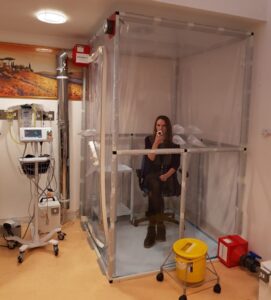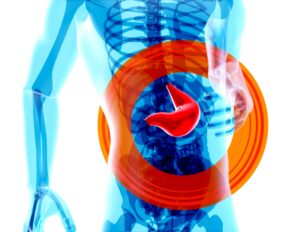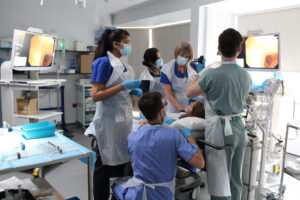A new study has identified that NHS infant checks can miss serious hip abnormalities in new-born babies. Left undetected, these can require complex surgery, and lead to early arthritis. The study, published by the JAMA Network, was led by researchers at the University of Liverpool in ... READ MORE
News
Breakthrough aerosol human infection model gives hope for future TB vaccine development
University of Oxford researchers have for the first time established a controlled human infection model for tuberculosis (TB) that infects people via the lungs – the way TB enters the body. The clinical trial, which used the BCG vaccine delivered via aerosol into participants’ lungs, is a first ... READ MORE
Recipients of BRC doctoral funding present PhD projects
Six Oxford University Hospitals (OUH) nurses and allied health professionals who have received funding from NIHR Oxford Biomedical Research Centre (BRC) have presented their PhD projects to their fellow awardees and supervisors. The BRC provides up to £10,000 for the year to give the recipients ... READ MORE
New study reveals long-term mental health risks after COVID-19
A new study has shed light on the long-term mental health consequences of COVID-19 infection and the growing evidence of the protective effect of vaccination on reducing the risk. The research, supported by the NIHR Oxford Biomedical Research Centre (BRC), was conducted in a population-based ... READ MORE
Study assesses new MRI technique to detect liver cancer
Oxford researchers have been awarded funding to conduct a study comparing a new type of MRI (Magnetic resonance imaging) to standard of care ultrasound for liver cancer surveillance in people with cirrhosis. The University of Oxford’s DeLIVER team, which is investigating early detection methods ... READ MORE
Oxford BRC researcher named NIHR Senior Investigator
NIHR Oxford BRC researcher Professor Ronjon Chakraverty has received a prestigious national research award. Professor Chakraverty, Professor of Haematology in the Radcliffe Department of Medicine and Oxford BRC Co-theme Lead for Gene and Cell Therapy, was named a National Institute of Health ... READ MORE
New bronchoscopy capability expands capacity for respiratory and vaccine trials
The NIHR Oxford Clinical Research Facility (EMCRF) has expanded its capability to undertake research bronchoscopies and welcomed its first volunteers as part of the Oxford Airways Study, which is supported by the NIHR Oxford Biomedical Research Centre, to help understand the causes of ... READ MORE
COVID jab linked to lower risk of COVID-19-related clot and heart complications
The risk of cardiac and clot-related complications following COVID-19 is substantially reduced in people who receive the COVID-19 vaccination, compared with unvaccinated individuals, according to new research. The observational study, which was supported by the NIHR Oxford Biomedical Research ... READ MORE
Oxford wins funding to set up UK’s first registry of those at risk of type 1 diabetes
Oxford researchers have received funding to set up a UK registry for children and adults who are at risk of type 1 diabetes (T1D), by testing positive for diabetes autoantibodies. Diabetes autoantibodies are proteins that appear when the insulin-producing beta cells in the pancreas are damaged. ... READ MORE
NHS health checks can help to reduce disease rates and mortality, study finds
A University of Oxford study has found that attending an NHS Health Check is associated with a decreased risk of dying and of diseases, such as dementia, heart attack, kidney disease and liver cirrhosis. The results, published in BMC Medicine, suggest that preventative programmes such as ... READ MORE
- 1
- 2
- 3
- …
- 83
- Next Page »









